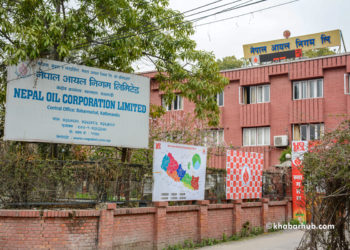Tourism and hospitality are some of the important sectors which provide employment opportunities to 1.5 million work. The pandemic has given a very big shock to this sector.
The tourist arrival went to ground level. Compared to other sectors negative effect may be long-lasting, may take two or three years or more for reactivate and rebounding.
Almost all the countries from which the tourists visit Nepal are all affected, their economies also crippled down resulting in a drastic fall in the purchasing power of the people.
The tourist arrival from advanced and developing will fall drastically, and from other countries, the prospect is rather bleak.
Central Bureau of Statistics predicts the tourism sector growth rate will fall by -16.3 percent in 2020. With the cancellation of hotel booking, spring mountaineering, Everest expedition, and all the touristic activities, thousands of workforce are left jobless.
The time that will take to reactivate and rebound the manufacturing sector will depend upon a regular supply of raw material along with the government policy support with adequate relief package.
And the total investment (Rs. 10 billion) done in this sector is at risk. Similar is the case of rural tourism.
Visit Nepal 2020 was announced in 2018 with the objective of attracting two million tourists and increased contribution of this sector to GDP along with increasing job opportunities.
It has been canceled with the emergence of the pandemic in January 2020. Promoting domestic tourism for compensating the loss of drastic fall in international tourists is distance reality for the near future even though COVID-19 is contained situation normalizes.
Manufacturing:
The manufacturing sector is also not spared by the pandemic. It employs about 1 million workers and contributes about 5.5 percent of GDP.
A latest official estimate shows the sector is predicted to shrink by -2.3 percent in 2020. Most of the manufacturing units are dependent upon imported raw material largely from China and India.
With the supply chain disrupted from these countries, smooth operation may not be possible within a short period.
The time that will take to reactivate and rebound the manufacturing sector will depend upon a regular supply of raw material along with the government policy support with adequate relief package.
Small and cottage industries that account for 60 of the total production units are most hit hard. A large number of the workforce engaged in this sector have lost their jobs.
Wholesale and Retail trade:
Nationwide lockdown and it’s a continuation for a long time has disrupted the trade sector very badly. This sector is a relatively larger sector contributing 14.37 percent to GDP and gives employment to 30 percent of the total workforce.
The sector is predicted to shrink by -0.1 percent in 2020, against the higher growth registered in 2019. Shortages and price hike has become a serious issue.
Stockpiling and black-marketing has been a common practice, monitoring and regulating the trade sector is missing as usual. To maintain the supply chain, the systematic store and reserve system should be developed.
Regular monitoring of the market is the urgent need of Nepal. Along with this storage capacity and warehousing facilities has to be enhanced.
Banking and Financial Sector
The banking and financial sector is one of the flourishing sectors and growing faster. Its contribution to the economy is reasonably higher.
As all the economic activities like production, distribution, and consumption and commerce are halted. The investment demand has been down to ground level and bank deposit decreased with the fall in remittance.
Halting of economic activities, collapse in trade and hospitality, sudden loss in income of people has created greater stress in the banking and financial sector.
Cash withdrawal has increased, which is the sign of a fall in confidence level on the BFI’s clients.
Many projects are facing a labor problem and a short supply of construction material. Most of the hydropower projects under Chinese construction agencies are deploying the Chinese workforce.
All the BFIs has been able to keep the proportion of non- performing asset at a reasonable level and it was 1.7 percent and 1.21 percent for commercial and development banks respectively in 2019. But due to the covid19 crisis, it is expected to increase.
The potential extensive default on loan and mortgage installment along with interest payment may be a serious threat to the financial system.
According to bankers, loan installment payment and payment of interest have been completely halted since the mid of January nor any demand for fresh loans posing a great threat to BFIs.
Infrastructure development projects: Construction activities in dozens of infrastructure development projects are also halted, making sure that many of these projects will miss their completion time due to an unprecedented crisis.
Many projects are facing a labor problem and a short supply of construction material. Most of the hydropower projects under Chinese construction agencies are deploying the Chinese workforce.
They went to China on the eve of Chinese New Year which happened to be in January. They were stranded in China because of lockdown and border closure.
In the rest of the other projects also a large number of workers went back to their hometown due to the closure of construction works.
So first and foremost responsibility of the government should be to give them immediate relief and investment in employment generating industries.
The third quarter of the fiscal year is the peak time for construction activities when projects work on full swing, and during the monsoon time, most construction activities more or less stop. This means that during 2020 construction activities will be hampered for a quite long time. Central Bureau Statistics predicts negative growth of this sector (-0.4 percent) in 2020.
The Way forward
Thus the mission of the coming budget should be to mitigate the side- effects of covid19. The government should announce a big relief package (at least 4 percent of GDP which is equal to NPR. 2 billion) considering the long-lasting negative effect of the pandemic.
All possible fiscal and monetary measures should be employed to save the economy.
To reactivate and rebound the economy we need vast resources. Introduction of relief package of NPR. 2 billion (5 % of GDP) is being demanded by the private sector.
Remittance has been decreased substantially and expected to shrink further. Public revenue has been downsized noticeably and also the prospect of raising tax revenue is rather bleak.
Similarly, FDI also cannot be relied upon, as most of the advanced countries themselves are in problem. We can take a soft loan from multinational agencies, but excessive reliance on external funding is not advisable as it creates a debt burden for the future.
Thus under this pretext, the government must resort to all possible measures to mobilize domestic resources and undertake austerity measures.
Cancel all unproductive expenditure and programs and avoid all types of duplication in expenditure. The government of India has announced 50 percent cuts in the salaries and allowances of Prime Minister, cabinet ministers, and all the parliamentarians for two years. Why can’t this be implied in Nepal at a time of crisis?
According to Public Expenditure Commission, about 40 percent of current budgetary expenditures are unproductive and can be canceled.
The programs/projects which are not result in the oriented need to be canceled. It is high time to implement recommendations of expenditure commission. This is the golden opportunity for Finance Minister to restructure the public expenditure.
Suggestions:
Prioritize health sector: Increase budget allocation to improve the health system and health infrastructure at local level, effective program to contain pandemic with wider coverage of testing, involve the private sector in the pandemic control, strengthen public and private health infrastructure and human resource development, protection and insurance of health personals, capacity building of regional and district level governments.
Prioritization of programs generating employment opportunities: It is predicted more than 2 million workers will be unemployed, and the return of migrant workers will add fuel to the fire.
About 500,000 workers anticipated to come back immediately after lockdown is relaxed. A large number from India has returned and still returning.
So the first and foremost responsibility of the government should be to give them immediate relief and investment in employment generating industries.
Self-employment opportunity to returnees with technical and financial backstopping, launching food for work program to informal sector workers who lost their jobs, targeted programs to support the workers, and businesses particularly small enterprises should be prioritized.
The regional and local level government should be actively involved in employment generating activities.
Modernization and commercialization of agriculture: provide an integrated package of inputs like seeds, fertilizer, technology and credit at a subsidized rate to the farmers, emphasize high-value crops and livestock, facilitation of marketing at the local level in collaboration of private sector, development of warehouses and processing center as a common facility, integrate returnees migrant workers in agricultural, leasing of public land to the farmers and encourage collective farming.
(Concludes)









Comment